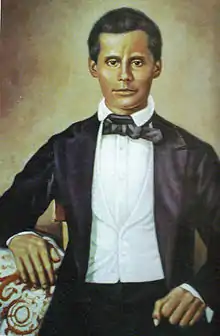Francisco del Rosario Sánchez
Francisco del Rosario Sánchez (March 9, 1817 – July 4, 1861) was a politician, national hero and founding father of the Dominican Republic. He is considered by Dominicans as the second leader of the 1844 Dominican War of Independence, after Juan Pablo Duarte and before Matías Ramón Mella. The Order of Merit of Duarte, Sanchez and Mella is named in honor of these men.

Life
Sánchez was the son of Olaya del Rosario Belén (1791–1849), a creole "free woman of color", and Narciso Sánchez Ramona (1789–1869), a descendant of slaves.[1][2] His surnames are inverted because his parents were not married at the time of his birth, marrying in 1819.[2][3]
Sánchez traveled to the U.S. and Europe as a young man. His vision of the cause was the typical republican goal of the Age of Enlightenment. Duarte's exile took place at the last and most crucial stage of the struggle. It was when Duarte was exiled and in hiding in Venezuela that Sánchez became the central presence in the Dominican revolt.
Sánchez took the lead as the prime mover of the independence movement, maintaining contact with Duarte through his relatives. While educated and having taught himself Latin and French later in life, he is mostly remembered as a man of action. In the proceedings that took place just before the proclamation of independence on February 27, 1844, Sánchez was elected by his peers in La Trinitaria as Commander in Arms and Chief of the Government Junta in the nascent republic. This was quite a recognition and a testament to his virtues.
After a brief period of turmoil and quick political succession, Pedro Santana exiled the main architects of the independence. Sánchez spent four years in exile and was eventually pardoned. He returned to the Dominican Republic in time to see Santana invite Spain to re-occupy the country as colony. Sánchez led a force in an attempt to overthrow Santana, but was captured by Santana's forces and executed in 1861.[1] After his death, Sánchez's sister, Socorro was exiled to St. Thomas for two years. When she returned to the Dominican Republic in 1863, she was imprisoned for a year for outspokenness against the regime.[4]
He is entombed in a mausoleum, Altar de la Patria, at the Count's Gate (Puerta del Conde) alongside Duarte and Mella, at the location of the start of the War of Independence.
See also
- Socorro Sánchez del Rosario, sister
- María Trinidad Sánchez, paternal aunt
References
- Amador, Luis; Hidalgo, Dennis R. (2016). "Sánchez, Francisco del Rosario (1817–1861), political and military leader". In Knight, Franklin W.; Gates, Jr., Henry Louis (eds.). Dictionary of Caribbean and Afro–Latin American Biography. Oxford, England: Oxford University Press. ISBN 978-0-199-93580-2. – via Oxford University Press's Reference Online (subscription required)
- Rodríguez Demorizi, Emilio (1976). Acerca de Francisco del R. Sánchez [About Francisco del R. Sánchez] (in Spanish). Santo Domingo, Dominican Republic: Editora Taller. p. 9. OCLC 1025652086.
Francisco del Rosario Sánchez, hijo de Narciso Sánchez y de Olaya del Rosario, "parda libre". Legitimado por matrimonio posterior, en 1819 [Francisco del Rosario Sánchez was born, son of Narciso Sánchez and Olaya del Rosario, free parda. Legitimated by subsequent marriage, in 1819.]
- González Hernández, Julio (11 March 2017). "Cápsulas genealógicas. Sánchez genealógico" [Genealogical Capsules: Sánchez Genealogy]. Hoy (in Spanish). Santo Domingo, Dominican Republic. Archived from the original on 2 January 2019. Retrieved 22 September 2020.
- Candelario, Ginetta E. B. (2016). "Sánchez, María del Socorro del Rosario (1830–1899)". In Knight, Franklin W.; Gates, Jr., Henry Louis (eds.). Dictionary of Caribbean and Afro–Latin American Biography. Oxford, England: Oxford University Press. ISBN 978-0-199-93580-2. – via Oxford University Press's Reference Online (subscription required)